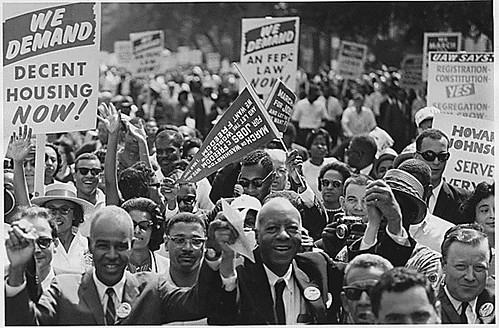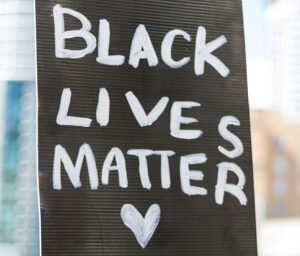Unity Based on Justice
 In July of 2020, UU Class Conversations published the blog post The Time to Unite as One America is Now about police brutality and the systemic oppression of Black and other people of color throughout the United States. It focused on how the deaths of black and brown men and women by police officers sparked international protests. The protesters were labelled terrorists, thugs and unpatriotic by some conservative media outlets and politicians.
In July of 2020, UU Class Conversations published the blog post The Time to Unite as One America is Now about police brutality and the systemic oppression of Black and other people of color throughout the United States. It focused on how the deaths of black and brown men and women by police officers sparked international protests. The protesters were labelled terrorists, thugs and unpatriotic by some conservative media outlets and politicians.
Just a few weeks earlier, some of the same media outlets and politicians had proffered a very different response when heavily armed, mostly White, protesters stormed the Michigan capitol building, threatening to kidnap and possibly kill the governor. Why? The rioters were upset about stay-at-home orders during a pandemic.
These protesters were called patriots. Police stood down, the National Guard was not called in to quell the unrest, and there were no arrests, no tear gas deployed, and no curfews imposed and enforced. Both times Americans were exercising their First Amendment rights. Yet, there were very different outcomes and consequences for those protesting.
Down a Dangerous Road
Well, fast-forward less than six months later and due to a steady stream of falsehoods and conspiracy theories from politicians, including the lame duck U.S. president about the legitimacy of the presidential election, a mob of armed white supremacists were incited to attempt an insurrection of another American Capital building. The intent was the same: Harm the legislature, including the vice president, speaker of the House and members of the House and the Senate. This time, the riot was deadly and dozens of police officers were injured and six people have died: All this in America.
Using Racial Tropes to Obscure Class
Why? Well, the idea that real Americans can only look a certain way and cannot be immigrants or people of color or a different religion. Many Americans overwhelmingly ignore the fact that class inequalities are not just part of the black or brown experience but a struggle for all Americans who are low-income or working class. This is increasingly true also for middle class people. This ingrained belief keeps many lacking class privilege from joining others of a different race or religion and undercuts any potential unity across racial lines.
There is little self-reflection for most Americans on how their class differences shape their backgrounds and unique attitudes and behaviors. Few consider how these class differences actually can bridge racial and religious divides, if explored. The class designation is overshadowed by the ever-present racial divide. So much so that economic initiatives often proposed by progressive or moderate politicians are viewed as handouts or bailouts by certain Americans. Stimulus checks, for example, are considered nonessential because they would go to the undeserving.
The idea that those with less class advantage are lazy is often intentionally conflated as coded messages about immigrants and people of color and creates an us versus them paradigm. Imagine, if people living in poverty and those in the working and middle class actually recognized that their commonalities outweigh their differences?
Our Truth
Some White poor and working class people continue to believe that they have more in common with others of their race who have substantial class privilege than they do with black and brown people of limited privilege. They have bought the idea that the We (Whites of all classes) have to stick together to protect our country, our flag, our families and our country’s traditions as Whites – despite economic differences. It’s imperative, or the them will take over, and as the neo-Nazi chant in Charlottesville suggested, they will erase us.
The idea that the votes of people of color are less legitimate than those of Whites is a shameful part of American history that is still alive and why insurrectionists carried Confederate flags through the Capital buildings during both riots.
With the current (and much-needed) focus on racial differences, Americans overwhelmingly are unable to recognize class and classism. Moreover, American economic and political systems that widen the income gap are rarely challenged in substantive ways. The status quo is the gold standard, and U.S. policies and practices routinely benefit the wealthy and affluent at the expense of other Americans.
Until we as a nation wake up and realize that the status quo is not working for most Americans, we are destined to routinely make the same choices that continue to divide us. And, if the latest insurrections teach us anything, there is a growing angry and violent group of Americans who, if not addressed, are intent on ripping the country apart.
But there is much cause for hope in the coming months. The end of the coronavirus – while still distant – is finally in sight. The fervor of the racial justice movement is still high. New federal leadership has said it is committed to addressing class inequities and white supremacy. So, in our UU congregations and organizations let’s heighten the meaningful dialogue – and act upon – racial and class justice.
Why I Volunteer
| By Elizabeth Cogliati
We don’t talk about money in this country enough. It is still a taboo topic. We also don’t talk about the ways in which money, and the lack thereof, affect people’s lives and their opportunities. Class is related to the cumulative effects of money and no money. We definitely do not talk enough about class, and how it affects people’s experiences of Unitarian Universalism. I want to encourage all of us to talk more about class, and money, and the effects they have on our congregants and our congregations. I think it is especially important to discuss this from a young age, and incorporate it into our religious education classes for children and youth. |
Class and Race
By Nancy Hilliard
As we move forward from this momentous springtime 2020, from, with the novel coronavirus and massive protests of the murder of black men and women, we need to keep in mind the consequences of racism in every context. Not surprisingly, poor people with fewer healthcare options are being hard hit by the novel coronavirus, far beyond the impact proportional to their numbers. However, even with limited accounting, the novel coronavirus is killing Black Americans at almost 3 times the rate of white Americans across the socio-economic spectrum. Black Americans have a shorter lifespan than White Americans with less than a high school education—even when they hold graduate degrees. Black Americans receive all the disadvantages of classism, and the healthcare gap continues up the class ladder; They receive none of the health advantages bestowed upon White Americans in the upper classes.
We are challenged to consider racism as it affects all of us, and as it intersects with class. Within the context of racism, classism is experienced and felt differently by people of color than by white people. I used to think that poor white people who argued that white privilege didn’t exist for them were merely ungrateful, certainly unaware. In a conversation with my nephew, he persisted in his description of poor people with mental health issues living on the streets, not enjoying any privilege whatsoever. I realized that perhaps the only privilege they did have was knowing they could walk to the corner store and back without being shot in the back or choked to death by police. And until recently, I had not been aware of how prevalent that risk of death is for so many in our communities even as I considered myself to be well-informed.
This short-sightedness has corrupted my understanding of classism; just as I have been dismissive of those in poorer classes who won’t see their white privilege, I have discounted hardship that is real for people of color in the wealthier classes. I find I have bought into the race-based explanation for class in the United States to a greater extent than I knew. I must catch and stop the thoughts that white people who are poor should work harder and look for those missed opportunities. I am also vulnerable to thoughts that people of color who have reached the middle and upper classes must have escaped the ravages of racism to a significant extent. It is easy to fall into the simplistic explanations that comfort those who enjoy the status quo. I am being disabused of these notions this season of COVID, this summer of rising awareness and the Wall of Moms.
We must keep learning about our world.
There have been eloquent personal blogs about being the Black Best Friend, and there has been much written in academic circles. The commentary of several leaders has been available recently, such as the writings of Michelle Alexander, author and visiting professor at Union Theological Seminary (New York City); the allegories of Dr. C Jones Camara Phyllis Jones of Emory and Morehouse School of Medicine; the words of David R. Williams of Harvard T.H. Chan School of Public Health; the prolific writings of Ibram X. Kendi. All call us to review our preconceptions and misconceptions about how classism works in the United States of America, and how the profitability of racism has molded our classist system.
The Time to Unite as One America Is Now
Nearly a century ago, white supremacists attacked the Greenwood District in Tulsa Oklahoma for 18 hours, resulting in more than 800 people being admitted to hospitals, 6,000 black residents interned at large facilities and many innocents murdered.
Greenwood in 1921 was known as the Black Wall Street full of successful Black-owned businesses and entertainment spots. The police did not intervene as the town was decimated, people were murdered and the survivors callously displaced.
More recently, one in a long string of American Black men was killed in police custody. The video of the atrocity showed the same abject callousness of the officers as one of them asphyxiated him and the others watched.
His murder has sparked protests nationwide. People from all over the United States – and now the world – are protesting American police brutality and systemic oppression of Black and other people of color throughout the United States.
Justice or Just Us?
While most are peaceful, the protesters have been labeled rioters, thugs and looters without much evidence other than the color of their skin by some media outlets and politicians.
What is so striking about this is the juxtaposition of the comments made by some of the same media outlets and politicians a few weeks earlier when heavily armed, mostly White protesters stormed an American capital building threatening the governor because they were upset about stay-at-home orders during a pandemic. At that time, these protesters were called patriots, and police stood down. No arrests, no tear gas deployed, no curfews, etc. Same America, same protests, yet very different outcomes. Why?
Inflaming Racial Stereotypes to Obscure Class
Well, a time-tested political strategy used in America purposefully inflames racial stereotypes to elicit strong actions and reactions. It pointedly exploits these stereotypes while being just vague enough so the perpetrator can feign he/she had no racist intent. Referring to a city as rat-infested or immigration from a certain group as an infestation or peaceful protesters as thugs are recent examples.
What makes this practice insidious is the fact that the U.S. economic inequalities are not just part of the black or brown experience but a struggle for all Americans in the working-class. This strategy keeps many in the working and middle class disjointed and undercuts the potential unity across racial lines. Economic initiatives often proposed by progressives or moderates are viewed as handouts or bailouts by the American majority and are often rejected despite their potential to help the poor and working-class.
The idea that hard-working Americans can only look a certain way and cannot be immigrants or women or people of color or a different religion gained traction in the late 1960s with President Nixon’s southern strategy. Cue the fanning of racial tensions whenever and whoever points out that the top 1% in the United States are steadily consolidating the country’s wealth by manipulating many political, educational and religious institutions.
Toni Morrison rightly claimed that the Civil Rights Movement magnified class differences within the American landscape. This sentiment was echoed by Dr. Martin Luther King’s awareness that the working-class is caught in “an inescapable network of mutuality tied in a single garment of destiny.” But coded messages about immigrants, LGTBQ+ individuals and racial/ethnic minorities and all kinds of religious intolerance create an us versus them paradigm.
Some … Not All
Some White working-class people have been duped by this message of inclusiveness and fealty to “the race” by those with substantial class privilege. They have bought the idea that the We (Whites of all classes) have to stick together to protect our country, our flag, our women and children, and our country’s traditions as Whites – despite economic differences. It’s an imperative, or the them will take over and erase us.
The truth – known by most UUs in the working-class – is that the working-class, along with those with even less class advantage, has always been multiracial, multiethnic and multilingual. Don’t all Americans want jobs with fair wages, health care, education for their children and to be a part of the American dream?
This Time Feels Different
Groups across race, religion and class are starting to unify when they find common causes like gun reform, ending police brutality, healthcare as a human right and fighting against class inequity. UU Class Conversations is more committed than ever to help UUs identify their assumptions about their class differences and build upon the unique strengths gained from their class background. We are committed also to help you start the difficult and uncomfortable but necessary conversations that help people make connections that lead to awareness – which is integral in any transformational process.
Let’s talk about – and act upon – racial and class justice.


